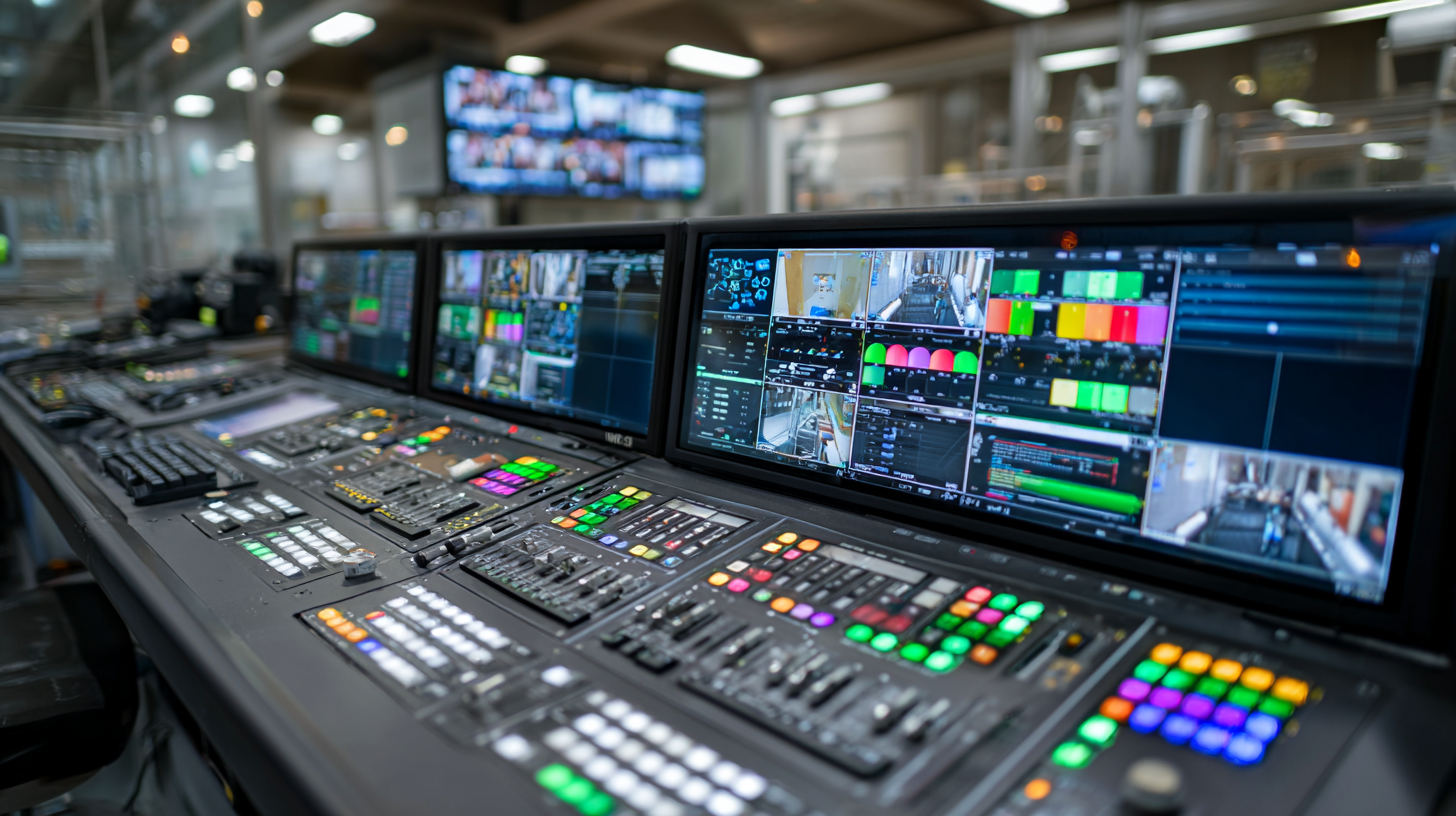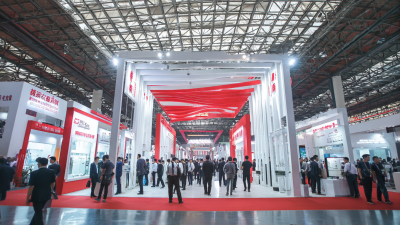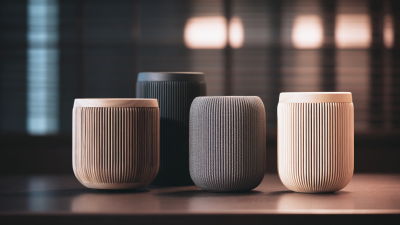Blog
Exploring the Future of Control Products: Innovations Shaping Industries Today
As industries continue to evolve in the face of rapid technological advancements, the significance of control products is increasingly at the forefront of innovation. According to a recent report by MarketsandMarkets, the global market for control products is expected to reach $XX billion by 2025, growing at a CAGR of XX% from 2020. This remarkable growth is driven by the rising demand for automation and smart technologies across sectors such as manufacturing, energy, and transportation. Innovations in control products, including advanced sensors, next-generation control systems, and integrated software solutions, are not only enhancing operational efficiency but also enabling real-time data analytics and predictive maintenance. As we explore the future of these critical tools, it is essential to consider how these innovations are shaping industries today, providing organizations with the capabilities to thrive in an increasingly competitive landscape.

Innovations in IoT Control Products and Their Impact on Smart Manufacturing Efficiency
The intersection of the Internet of Things (IoT) and smart manufacturing is reshaping the industry landscape, demonstrating remarkable potential for enhancing operational efficiency. By 2025, the global IoT in manufacturing market is expected to reach $141.18 billion, following a valuation of $116.52 billion in 2024. This impressive growth reflects the increasing adoption of IoT technologies that enable real-time data analysis, predictive maintenance, and automated processes, leading to reduced downtime and improved productivity.

One significant innovation in this sector is the application of IoT-enabled sensors that monitor machinery performance and supply chain logistics. These advancements provide manufacturers with critical insights, allowing them to streamline operations and respond swiftly to market demands. Moreover, as the industry embraces digital transformation, the push for environmental sustainability becomes paramount. Companies are increasingly utilizing IoT solutions to optimize resource usage and minimize waste, thereby aligning their operations with sustainable practices.
Tips: To maximize the benefits of IoT in manufacturing, companies should invest in employee training on new technologies. Additionally, integrating IoT systems with existing infrastructure can accelerate the transition and enhance compatibility across processes. Emphasizing sustainability not only meets regulatory requirements but also resonates well with eco-conscious consumers.
The Role of AI in Enhancing Control Systems for Real-Time Data Processing
As industries evolve, the integration of artificial intelligence (AI) into control systems is revolutionizing real-time data processing. AI algorithms enhance the responsiveness and efficiency of control products by enabling predictive analytics and adaptive learning. This ensures that systems can react to changing conditions with unmatched accuracy, optimizing operations across manufacturing, energy, and transportation sectors.
**Tip:** When considering AI for your control systems, assess your data infrastructure first. Ensure that data collection is reliable and that you have the necessary bandwidth to handle real-time processing demands. A solid data foundation is crucial for AI to deliver meaningful insights.
Moreover, AI-driven control systems are now capable of learning from vast amounts of operational data, which allows for the continuous improvement of processes. This intelligent self-optimization not only reduces human error but also contributes to significant cost savings and increased productivity. Industries can now harness the power of AI to stay competitive and innovative in an ever-changing market landscape.
**Tip:** Collaborate with technology providers who specialize in AI-enabled solutions. They can provide the expertise needed to implement these systems effectively and tailor them to meet your specific operational challenges.
Trends in Automation: How Control Products Drive Industry 4.0 Adoption
The landscape of industrial automation is rapidly evolving, driven by the formidable advances in control products that are essential to the Industry 4.0 paradigm. These products, which include sensors, controllers, and software solutions, play a pivotal role in the seamless integration of smart technologies within manufacturing processes. By enhancing real-time data collection and analysis, control products enable businesses to optimize operations, improve productivity, and reduce downtime. This transition not only facilitates a more interconnected environment but also promotes agility within supply chains, allowing companies to respond swiftly to market demands.
Another key trend in automation spurred by control products is the move towards predictive maintenance. By leveraging sophisticated algorithms and machine learning, these tools can analyze equipment health and predict failures before they occur, significantly lowering maintenance costs and extending the life cycle of machinery. As industries adopt these innovations, the emphasis shifts from traditional reactive maintenance practices to a proactive approach, ensuring operational efficiency and minimizing disruptions. Such advancements are at the forefront of defining how industries function today and will shape their trajectories in the future, ultimately reinforcing the significance of automating processes.
Exploring the Future of Control Products: Innovations Shaping Industries Today
| Dimension | Description | Current Trends | Impact on Industry 4.0 |
|---|---|---|---|
| IoT Integration | Devices interconnected for data sharing | Increased sensor deployment | Real-time monitoring and control |
| AI and Machine Learning | Automating decision-making processes | Predictive maintenance models | Enhanced efficiency and reduced downtime |
| Cybersecurity | Protecting control systems from threats | Increased focus on secure protocols | Safeguards against operational disruptions |
| Cloud Computing | Remote data access and storage solutions | Growing adoption of edge computing | Flexibility in resource allocation |
| Digital Twins | Virtual replicas of physical assets | Simulations for performance analysis | Optimized operations and maintenance |
Sustainability in Control Products: Meeting Growing Environmental Standards in Industry
The future of control products is increasingly intertwined with sustainability, as industries strive to meet growing environmental standards. As regulations around emissions and waste management become more stringent, control product manufacturers are innovating to create solutions that not only enhance operational efficiency but also minimize environmental impact. This shift is driving the development of eco-friendly materials and energy-efficient systems that reduce the carbon footprint of industrial operations.
Furthermore, the integration of advanced technologies, such as IoT and AI, plays a crucial role in enhancing sustainability within control products. These technologies enable real-time monitoring and analysis of energy consumption and resource usage, allowing companies to optimize processes and identify areas for improvement. By adopting smart control systems, industries can proactively manage their environmental performance and adapt to changing regulations, demonstrating a commitment to sustainable practices while maintaining competitive advantage.
Exploring Sustainability in Control Products
Future-Proofing Control Systems: Adapting to Evolving Regulatory and Market Demands
As industries continue to evolve, the need for control systems that can adapt to changing regulatory frameworks and market dynamics becomes ever more critical. Innovations in control products are not merely about enhancing performance; they are about ensuring compliance with new standards and fostering resilience against market fluctuations. Manufacturers are increasingly leveraging advanced technologies such as artificial intelligence and machine learning to develop systems that can self-regulate and provide real-time analytics, enabling organizations to respond swiftly to regulatory changes and market demands.

Moreover, with the growing focus on sustainability and efficiency, future-proofing control systems involves integrating eco-friendly solutions that align with both regulatory requirements and consumer expectations. This shift towards sustainability is driving innovations like energy-efficient controls and smart automation, which contribute to reduced operational costs while promoting environmental responsibility.
By investing in robust and adaptable control products, industries can secure their competitive edge, ensuring they remain compliant and relevant in an ever-changing landscape.
Related Posts
-

Exploring Acoustic Windows Trends at 2025 China Import and Export Fair
-

The Power of Sound How Acoustic Products Enhance Our Daily Lives
-

Transform Your Space: The Ultimate Benefits of Noise Reduction Panels for Home and Office
-

Exploring Noise Insulation Innovations: Insights from the 138th Canton Fair 2025 and Industry Growth Projections
-

Transform Your Space: The Ultimate Guide to Acoustic Treatment Panels for Superior Sound Quality
-

Discovering Trends in Interior Panels at the 138th Canton Fair 2025 in China
